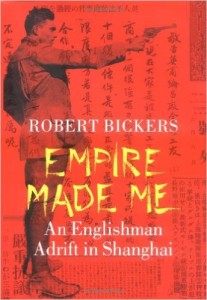Since James Joshua Hudson brought it up on Facebook, I thought I would say something about teaching with Robert Bickers’ Empire Made Me: An Englishman Adrift in Shanghai. I have blogged about it before, but basically it is a biography of an English WWI vet and Shanghai policeman , Richard Tinkler, who manages to go down the tubes at about the same rate the empire does.
I used it in an Honors Core unit that was supposed to deal with “How do we understand and use the past? What therefore, should we do.” and I built it around the theme of biography and autobiography. This is a good book to use for biography, since Bickers talks about Tinkler’s life but also how he came to know about it. He has a good but spotty collection of sources and talks a bit about how we find out about the past and what we can’t know. For instance, he has some photos and some other evidence that Tinkler was at one point in a pretty serious relationship with a White Russian girl. Then…nothing. What happened? You might think with more documents we could figure this out, but sometimes all the documents and interviews in the world can’t tell you want went wrong with a relationship between two people.1 Bickers also does a good job of putting Tinkler in the context of the city and how it was changing around him. Chinese nationalism was growing, the British Empire was declining. Enough to drive a man to drink.
Student reaction to the book was mixed. I think they learned a lot, but they did not always enjoy it. He is not an admirable character, and was impossible for them to identify with, since he was a racist. Also, he was a loser, someone who started out as a promising young person but had become a failure by age 35, which is of course not a relevant trajectory for an Honors College student. Obviously identifying with the main figure in the book is not the only thing you can do with a narrative, but it is the one they are used to.
The book I usually paired it with was Orhan Pamuk’s Istanbul: Memories and the City, which is the story of his growing up in Istanbul. He is not a loser (won the Noble Prize, although only once so far) and like Bickers it is as much about a place as about a person. This was, I think, the one they enjoyed most, although it was also the easiest to enjoy as a series of vignettes. Also the Honors College used to do a regular summer trip to Turkey, and this may have helped get them interested. Still, the basic pattern of a smart, person coming to understand the world around them is one that they could relate to.
I also tried it once with Alan Taylor’s William Cooper’s Town: Power and Persuasion on the Frontier of the Early American Republic I thought it would pair well with Bickers since it is also about a place and a person. In this case it was about the founder of Cooperstown, New York (and father of the novelist James Fenimore Cooper) and his career as a land agent, speculator, and later judge and congressman. He is basically Tinkler made good, a young man who leaves home to go to a new place and gain the status and money he longs for.
They -really- did not care for this book, since it is long and, like Tinkler, Cooper is a hard person to warm up to. He was obsessed with becoming “genteel”, which was not a motivation modern students find easy to grasp. That was actually one of the reasons I assigned it, since I wanted at least one text on a pre-modern person.
One book that did work well was Hue-Tam Ho Tai. Passion, Betrayal, and Revolution in Colonial Saigon: The Memoirs of Bao Luong. The really got into this, in part I think because you can read it as a coming-of-age story, a murder mystery, a relationship gone bad story….All things they have read before. The fact that the main character is female probably helped too, as about 75% of the students were as well.
So I guess my take-away would be that if you want to engage undergrads (and these were freshmen) in understanding ways people write about lives you are best to choose an admirable character who is not that remote from them in time, and also fits in with some sort of narrative they are already familiar with. Of course part of the purpose of a class like this is to get beyond their comfort zone, but you start where you start. I guess this is why in a Modern China class I always get good results with Cultural Revolution narratives about a young person gradually realizing that everyone around them is crazy.
A couple other things I used were Ge Hong’s Autobiography (from Ebrey) and the first bits of Mark Twain’s autobiography. These both worked well as short examples you could use to show students how to do close reading.
Interestingly, if you look at the picture of Tinkler’s funeral there is a white-looking girl in a white dress mixed in with the Shanghai Police contingent.. A daughter? ↩

I would not want to teach this book to undergrads either. But what attracted me most to “Empire Made Me” was the style in which it was written. It doesn’t read like a lot of conventional history monographs, but has a prose style that seems looser, almost like a pulp novel (maybe that was his intention?). Even Bickers’ chapters aren’t broken up into sections, but consist of one long chain of narrative. Anyway, thanks for posting about the book in your blog. I found your discussion of the other books useful, since I am not familiar with any of them.